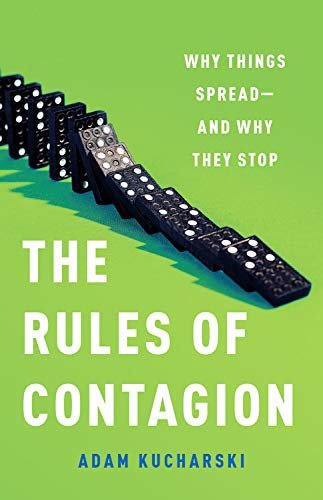The Rules of Contagion: Why Things Spread - and Why They Stop
You have to read a book and have good collections for your library to expand your knowledge. The book is available at Amazon.com
https://www.amazon.com/Rules-Contagion-Outbreaks-Infectious-Diseases-ebook/dp/B07JLSHT7M
https://www.amazon.com/Rules-Contagion-Things-Spread-They/dp/1541674316/
Unfortunately, the world is facing a lethal virus. A political movement is gathering momentum, and then quickly disappearing. The vision is like a wildfire and forever transforms our planet. We live in a more interconnected world than ever. Our lives are shaped by disease outbreaks, misinformation, and even aggression, which emerge, spread, and fade away with a disconcerting pace.
We need to learn to understand the secret laws that rule them. The Rules of Contagion offers insightful insights into human actions from the 'super-spreaders' that could cause a pandemic or bring the financial system down to the social dynamics that make isolation catch on, and discusses how we can better predict what happens next.
Along the way, Adam Kucharski discusses how inventions spread through networks of connections, what ties computer viruses to folk stories-and why the most important predictions are not always the ones that come true.
The Rules of Contagion is at its best popular science. The prosa is transparent and sparkling. The subject is deeply fascinating and highly important. Touching on psychology, medicine, network theory and mathematics, epidemiologist Adam Kucharski wrote a fascinating and definitive guide to the secret laws of how things spread- theories and memes, to aggression and deadly viruses. The book is also a highly infectious example of its subject matter: once you've read it, you'll want to make sure that others read it too.
For those who want to find out a bit about the math behind "contagion" spread it is a really good text. The book deals not only with epidemiology but also with a much broader context of stock markets and social media and the mechanism behind something that goes "viral," while others do not. This is not a biology book as it was written by a mathematician, but it is not a mathematics book either. If you're like me-somewhat nerdy-you'll become familiar with key epidemiological terms and concepts, but you'll need to look elsewhere for the detailed math behind them. Don't worry if you're not into math. The book also fits perfectly for non-technical audience.
Source: https://bloggerhorizons.blogspot.com/
https://bloggerhorizons.blogspot.com/2020/04/cities-of-strangers-making-lives-in.html
